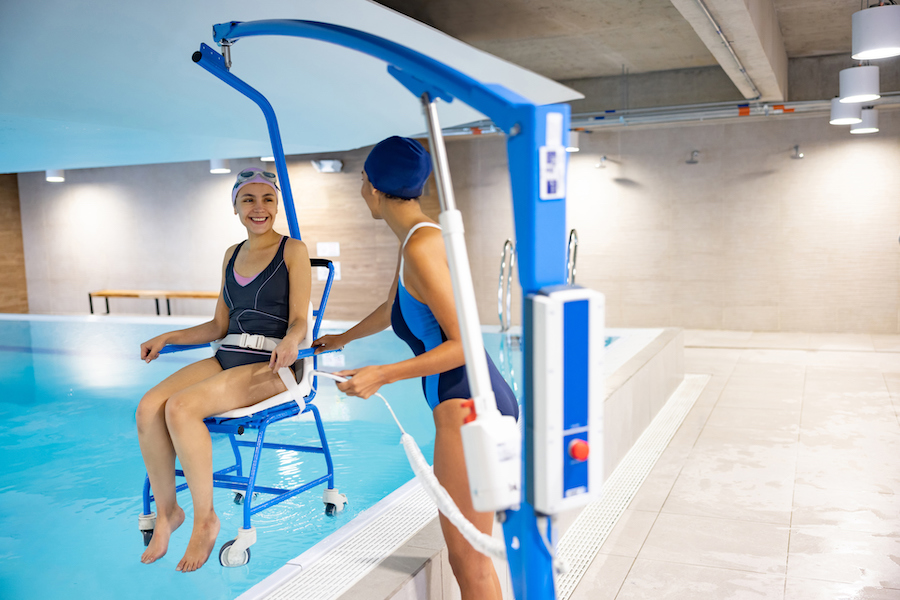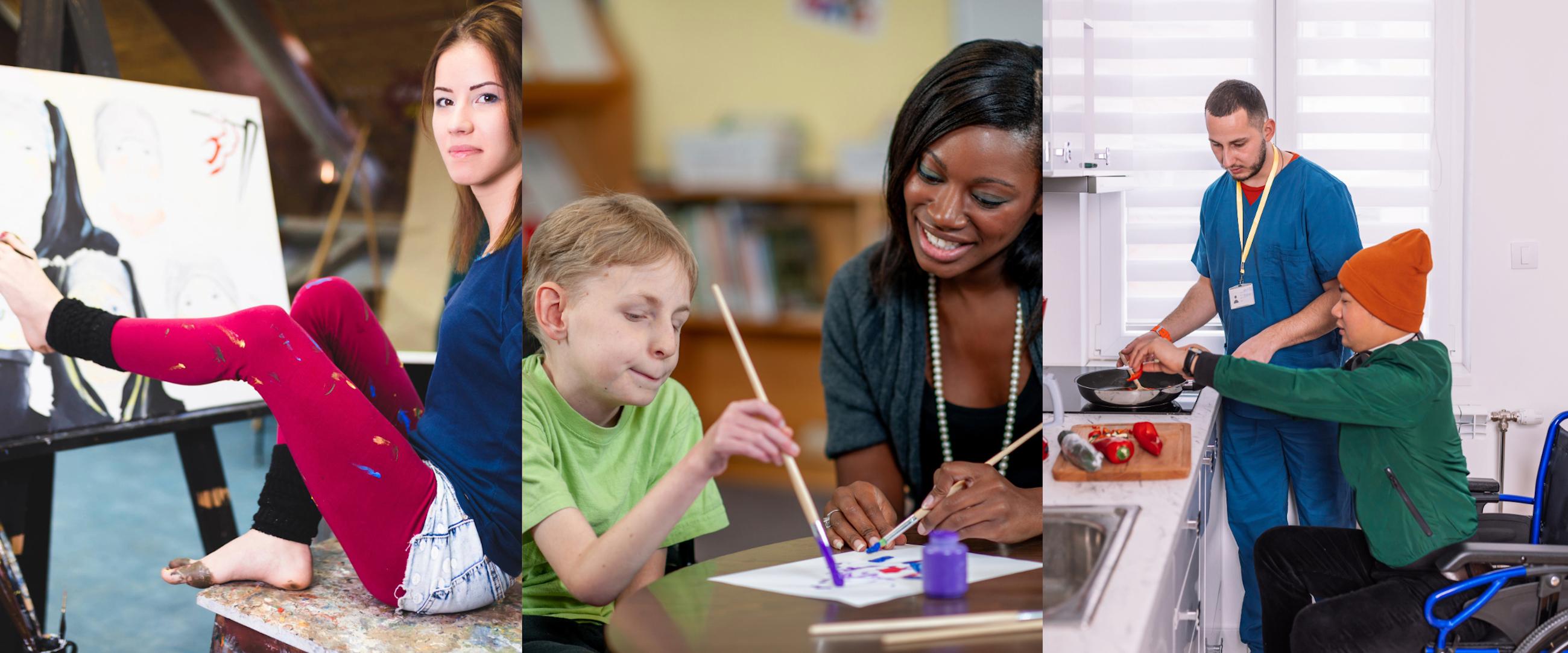The master's degree in occupational therapy (MSOT) is a two-year, 60-credit program that, when completed, allows the graduate to sit for the required national certification exam* to become a registered occupational therapist (OTR). The MSOT at Southern entered its first class in the summer of 2025. Students complete 4 academic semesters, including two summers, followed by the required 6 months of supervised fieldwork, prior to graduation.
Program Features
- Two years of full-time study, two summers included
- 60 credits
- Cohort of up to 40 students per year
- Integrated curriculum focusing on occupation
- Evidence-based education, such as active engaged learning with flipped classroom
- Emphasis on community service learning
- Alternative grading approaches that focus on learning over grades
- Two modules per semester to focus on fewer courses at a time
- Late day schedule
- Holistic admissions process
- A mission to foster greater diversity in the profession and to support student belonging
- Expert and exceptional faculty

Our mission is to intentionally cultivate a diverse and compassionate community with a sense of belonging, who will embrace human differences, and excel in the provision of occupational therapy with hope, humility, and creativity. As occupational therapists who believe in occupational rights, we will champion access to personally meaningful activities, and skillfully promote, and inspire positive change for the health, wellbeing, and resilience of all people.
We envision an effective interprofessional health care system, where occupational therapy is a diverse profession that is understood and valued for its unique perspectives and skills and sought after by community members who believe in the power of human occupation to improve health and wellbeing.
Our motto will be OT Unbounded, as we seek to create occupational therapists who will identify needs, and creatively generate collaborative and effective solutions that are not limited by the “traditional” occupational therapy practice boundaries within our U.S healthcare system. Our goal is to unleash a diverse occupational therapy force for change, with students who understand and appreciate the value of human differences, who understand that there may be multiple correct solutions and multiple opinions, who will seek out the knowledge of others within their learning community when needed, and who will actively work for change where change is needed.
We share the philosophy espoused by AOTA (2020) and Hooper and Wood (2019), that humans are occupational by nature and require occupation to thrive and flourish. Occupations influence health, well-being, and quality of life. The occupational therapy profession’s core values of altruism, equality, and justice, therefore, insist that we must adopt the stance that equal access to occupational opportunities is a human right (Hammell, 2015).
We believe that humans have evolved as social beings who naturally and intentionally engage in occupations and seek human connection and belonging. Humans continually shape and are shaped by their families, culture, communities, environments, opportunities and/or circumstances. Therefore, no two human lives are identical. Each life is a dynamic adventure created by one’s occupational choices. These individually fashioned patterns of occupational engagement influence health and wellbeing. We believe that while all humans have the right to engage in a variety of meaningful occupations, not all humans have equal access or opportunity. Therefore, we pledge to do our part to forge changes to make occupations accessible within our communities.
Many creatures on this planet engage in “doing” and many live in social groups, however, humans have the capacity to self-reflect, make meaning, create community, plan, create, imagine, innovate, and choose to alter their lives. Occupational therapy supports human hope, change, and growth, imagining with our clients, lives that are filled with valued and meaningful occupations.
The Occupational Therapy Program at Southern Connecticut State University is guided by an expert advisory board comprising professionals with clinical practice expertise across ten distinct areas. Many members also bring valuable academic experience. The inaugural board members have committed to serving on the advisory board for terms ranging from one to three years, with subsequent terms being set at three years. Advisory board members review the program’s strategic plan, competency assessment framework, and course syllabi, ensuring coverage that is appropriate to local community needs as well as the national occupational therapy standards.
The program wishes to publicly acknowledge and express our gratitude and appreciation for their commitment to this program. The current advisory board members include:
- Madison Altermatt
- Carrie Audino
- Jill Battaglia
- Dr. Tajhma Burroughs
- Jackie Carr
- Stephanie Carulli
- Christine Cascella
- Katilyn Chambless
- Beth Cho
- Dr. Andrea Coppola
- Dr. Elissa Longo Cunningham
- Lorin Dalessio
- Lou Elmo
- Lee Fallet
- Mary Giarentano
- Jaclyn Lavigne
- Leah Kragh
- Dr. Lisa Michael
- Kelly Orsino
- Dr. Lenore Salomon
- Dr. Joan Sauvigne-Kirsch
- LaShanda Smith
- Elizabeth Staffieri
- Debbie Volpe
- Dr. Patricia Walker
- Bethany Walker
- Daniella Muniz
Understanding Human Occupational Performance
- Evaluation and assessment of humans, occupations, and environments
- Considering the impact of social factors, diagnoses, conditions, and human development on occupation
- Activity analysis and observation skills
- Using tests and measures appropriately
Human Occupation as an Agent of Health, Wellbeing, and Change
- How occupation relates to health and wellbeing
- The importance of learning, change, and growth throughout the lifespan
- Clinical reasoning and evidence-based practice skills for selecting and implementing effective interventions through occupation
- Specific interventions for occupations
- Adapting equipment, tasks, and activities
- Environmental modifications and innovations through occupational therapy
- Evidence-based practices
Community Empowerment and Advocacy for Occupational Access
- Creating community, belonging, and bridging differences
- Occupational rights and access
- The capabilities model
- Relationships between social determinants of health and occupational access
- Needs assessment and program development
- Community advocacy
- Community service learning
Belonging to the Profession of Occupational Therapy
- The profession's history, unique perspectives, ethics, values, and professional behaviors
- Developing professional identity
- Creating a professional portfolio
- Collaboration in interprofessional teams
- The power of presence
- Cultivating resilience in healthcare
- Crafting a career
- Becoming a champion for change
Special collaborative opportunities in the community, international, and interprofessional education experiences are vital components of our occupational therapy (OT) curriculum, enriching learning by exposing students to real-world challenges and diverse perspectives.
Community-based and international collaborations provide students with hands-on opportunities to engage with individuals, families, and organizations, fostering a deeper understanding of occupational performance within varied contexts.
Interprofessional education (IPE) experiences, where students work alongside other healthcare and education professionals, prepare future OTs to thrive in interdisciplinary teams, promoting effective communication, shared decision-making, and holistic client care.
Together, these opportunities enhance clinical reasoning, cultural competence, and leadership skills, ensuring that graduates are well-equipped to navigate the complexities of modern healthcare and community-based practice.
Our students at SCSU will have the opportunity to be involved with the following community and international partners:
- Go Baby Go
- The Maria Beatrice Center (Romania)
- The Romanian OT Association
- Project Blinden Vision (Romania)
They will also be engaged in frequent interprofessional experiences with
- Recreation therapy faculty and students
- Speech-language pathology faculty and students
- Nursing faculty and students
- Special education and assistive technology faculty and students
- Exercise scientists and physical therapists faculty and students
- Certified Occupational Therapy Assistants faculty and students
Information Session
Explore the benefits of an Occupational Therapy career, including job flexibility, autonomy, and salary prospects, alongside an overview of the program's structure, curriculum, clinical experiences, faculty, and admission requirements. Consider if this career aligns with your goals, interests, and skills.
About Occupational Therapy
Occupations are the meaningful activities that people do every day and occupational therapists help people to engage in their chosen occupations. Occupational therapists work with people from birth to death, to promote their ability to DO what they want and need to do. Occupational therapists offer hope, and provide solutions, so that individuals can live their lives engaging in the things that are important to them. Occupational therapists work in the hospital, in outpatient clinics, in the home, private businesses, and in the community for a variety of community organizations. The two largest practice settings are the public schools and extended care facilities or nursing homes.

A career in occupational therapy is an excellent career choice. There are good jobs available that provide an exceptional salary. According to the BLS, employment of occupational therapists is projected to grow 14 percent from 2021 to 2031, much faster than the average for all occupations and the median annual wage for occupational therapists was $85,570 in May 2021. In the state of CT, occupational therapists make even more on average, over $94,000 per year.

Applying
Learn about the admissions process for the occupational therapy program.
To apply, visit the Admissions Guide.
Required Prerequisites Include
- Human Anatomy and Physiology I and II with lab (8 credits)
- Lecture content for A&P may be online, however the lab portion must be in person and all testing must occur in person.
- Abnormal Psychology (3 credits)
- Lifespan or Human Development courses that cover the lifespan (3-9 credits)
- Sociology or Social Psychology (3 credits)
- Research Methods / Introductory Statistics (3 credits)
Performance on Prerequisites
- All prerequisite course grades B- or better, however, the combined prerequisite GPA must be a 3.0. Courses must be taken for a grade and not as pass/fail.
- Any single prerequisite course may have been retaken, but only once.
- Prerequisites have no expiration date.
Deadlines for Prerequisites
- Only one prerequisite course may be in progress at the time of the application deadline.
- If a prerequisite is in process at the time of application deadline, applicants may be awarded conditional acceptance and admission may be revoked if the prerequisite grade and/or cumulative GPA requirement is not met.
Recommended Undergraduate Courses
- Courses related to social justice/ social bias/ gender, sexuality, social determinants of health, cultural humility, or racial bias
- Kinesiology
- Foreign language / Spanish for healthcare
Tuition and Fees
|
|
Summer 2026 |
Fall |
Spring 2026 |
Summer 2027 |
Fall 2027* |
Spring 2028* |
Total** |
|---|---|---|---|---|---|---|---|
|
In-State Tuition*** |
$7,425 |
$4,358 |
$4,358 |
$7,425 |
$2,420 |
$2,420 |
$28,406 |
|
University Fees |
$55 |
$3,122 |
$3,122 |
$55 |
$2,045 |
$2,045 |
$10,444 |
|
Program Fees** |
$300 |
$300 |
$300 |
$170 |
$170 |
$1,240 |
|
|
Total |
$7,480 |
$7,780 |
$7,780 |
$7,780 |
$4,635 |
$4,635 |
$40,090 |
Tuition and Fees are established by the Connecticut State Colleges & Universities Board of Regents for Higher Education. This listing is intended to help estimate the costs of attending Southern and students are responsible for any fee increase that the Board of Regents authorizes up to the first day of classes.
*Assumed flat for 2028. Tuition has not been established for 2028, and this figure may increase.
**Program fee pay for a variety of consumable materials used in the curriculum, as well as requirements for field experiences and capstone.
***Please note: Southern Connecticut State University participates in the New England Board of Higher Education (NEBHE) tuition break program. Currently, full-time matriculated students from Maine, Massachusetts, New Hampshire, New Jersey, New York, Rhode Island, and Vermont receive the opportunity to enroll at a discounted tuition rate. Pennsylvania was added in Fall 2024. Effective Fall 2025, the NEBHE tuition break will also apply to full-time graduate and undergraduate students from Delaware, Maryland, Washington DC, Virginia, North Carolina, South Carolina, Georgia and Florida.
See detailed information regarding tuition and fees.
Program Location and Accessibility
The majority of the occupational therapy program is provided in person on the New Haven campus of SCSU. Classes are held primarily in the Health and Human Services (HHS) building, which is fully accessible. All other in-person and on-campus learning environments are fully accessible as well. Online courses in the program will be held via Blackboard, will be created using UDL, and will be accessible according to the ADA standards. Students must be able to meet the essential functions of an occupational therapy student with reasonable accommodations in accordance with the Americans with Disabilities Act (ADA) and Section 504 of the Rehabilitation Act of 1973.
Program Technology Requirements
Students will be required to have access to the internet, and the ability to access Blackboard and other online tools and resources. Please see the technology provided by SCSU.
Accreditation
*The entry-level occupational therapy master’s degree program has applied for accreditation and has been granted Candidacy Status by the Accreditation Council for Occupational Therapy Education (ACOTE) of the American Occupational Therapy Association (AOTA), located at 7501 Wisconsin Avenue, Suite 510E, Bethesda, MD 20814. ACOTE’s telephone number c/o AOTA is (301) 652-AOTA and its web address is www.acoteonline.org. The program must have a preaccreditation review, complete an on-site evaluation, and be granted Accreditation Status before its graduates will be eligible to sit for the national certification examination for the occupational therapist administered by the National Board for Certification in Occupational Therapy (NBCOT). After successful completion of this exam, the individual will be an Occupational Therapist, Registered (OTR). In addition, all states require licensure to practice; however, state licenses are usually based on the results of the NBCOT Certification Examination. Students must complete 24 weeks of Level II fieldwork within 12 months following completion of the didactic portion of the program. Note that a felony conviction may affect a graduate’s ability to sit for the NBCOT certification examination or attain state licensure.
| 2024 | 2025* | 2026 | |
| Number of Program graduates | 0 | 0 | 0 |
| Graduation Rate | 0 | 0 | 0 |
*We are required to report data for the prior 3 years. However, our first cohort will not begin until 2025 and graduate in 2027, therefore we have no data at this time.
Application Deadline: February 1, 2026
School / College
College of Health & Human Services
Department
Recreation, Tourism and Sport Management
Contact
Dr. Heather Kuhaneck
Dr. Kyle O'Brien

